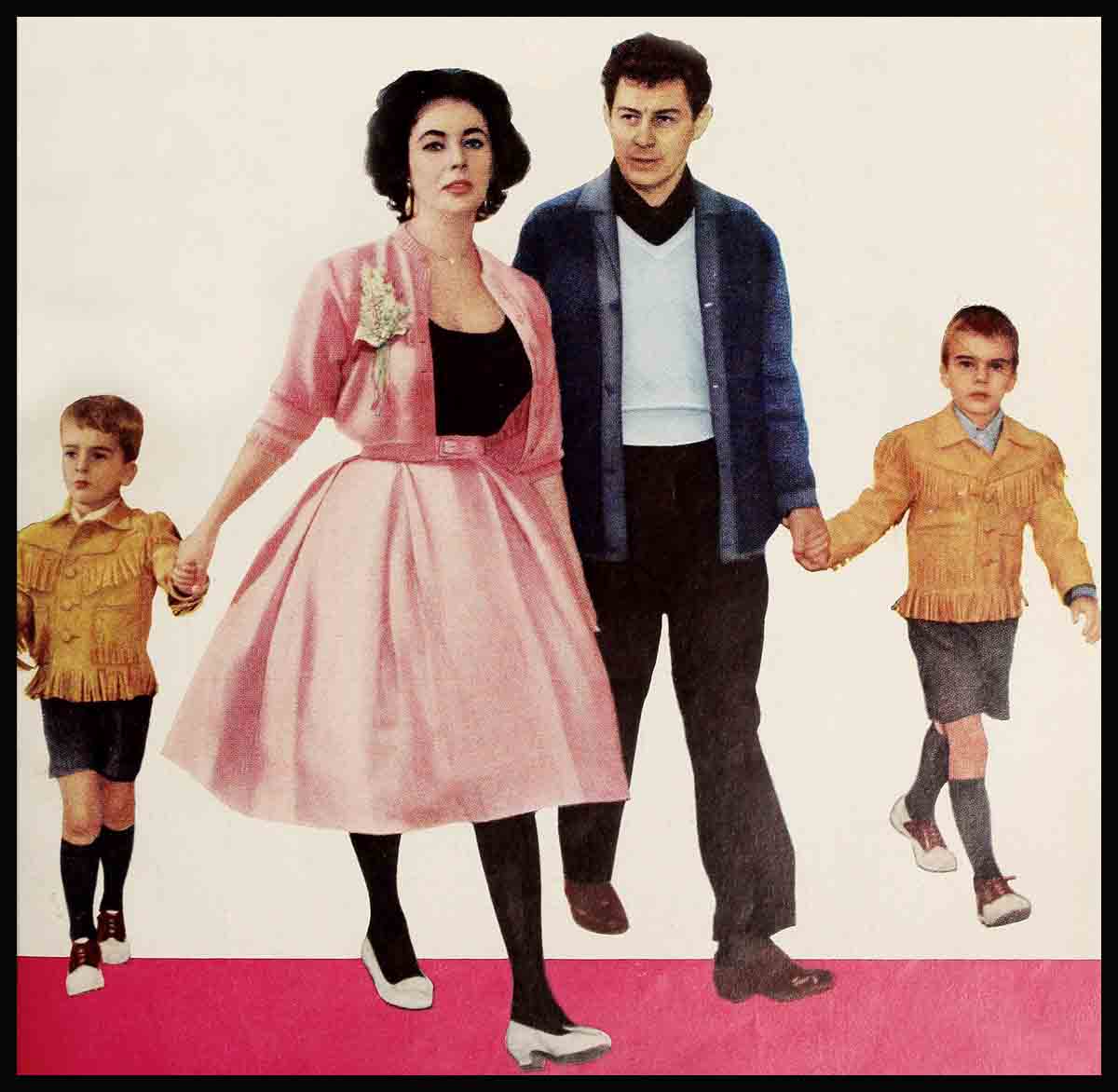
Why We Believe In Elizabeth Taylor And Eddie Fisher’s Marriage?
His eyes glued on the T-V camera, Eddie Fisher is singing a love song to one person . . . Waiting in the wings, unaware that she is being photographed, her eyes fixed in pain and excitement, stands Liz. She has not missed a show, or a rehearsal for months. That is her man on camera. That is the man she will marry despite what the world may think. In this private moment, her eyes prove what so many have denied, that hers is a very very true love . . . It was one night recently when. Eddie announced to the world that he and Ing will definitely marry.
He phoned a reporter to make that announcement. Earlier that day, Debbie Reynolds had gone to court to file officially for divorce. Eddie hadn’t appeared. A few days before, with his lawyers and Debbie’s, he had agreed to go full-way on a financial settlement—Debbie could have their $150,000 home, his $100,000 life insurance policy, $40,000 a year alimony. Debbie could have anything, Eddie had said, just as long as he got his divorce and was free to marry Liz Taylor.
Now, that settled, he announced the marriage.
But he didn’t say when.
And so the rumors began to fly.
Two rumors led the rest.
One was that the couple would wait the full year required by California law fora divorce to become final and that they would marry in February, 1960.
The other was that Eddie and Liz would go to Mexico and marry there, pronto.
MODERN SCREEN decided to find the truth—at any cost.
We went where we shouldn’t; we talked to people we had no business talking to; and we learned from these top-secret sources that both rumors are false.
First: Eddie and Liz are too much in love to wait a full year.
And second: Liz does not want to marry Eddie in Mexico, the same place where she married Mike Todd and where Eddie was their best man. . . .
These are the outward facts.
What follows is the inside story of two people who have been already married in spirit these past few months, a spirit fused by their undeniable love for one another, their love for their children, by the manner in which they have faced a basically hostile world together, in which they have helped one another fight the fears and hurts and—yes—the sadness in their hearts.
Our information comes straight from three people very close to Eddie and Liz.
Here is what they had to say. . . .
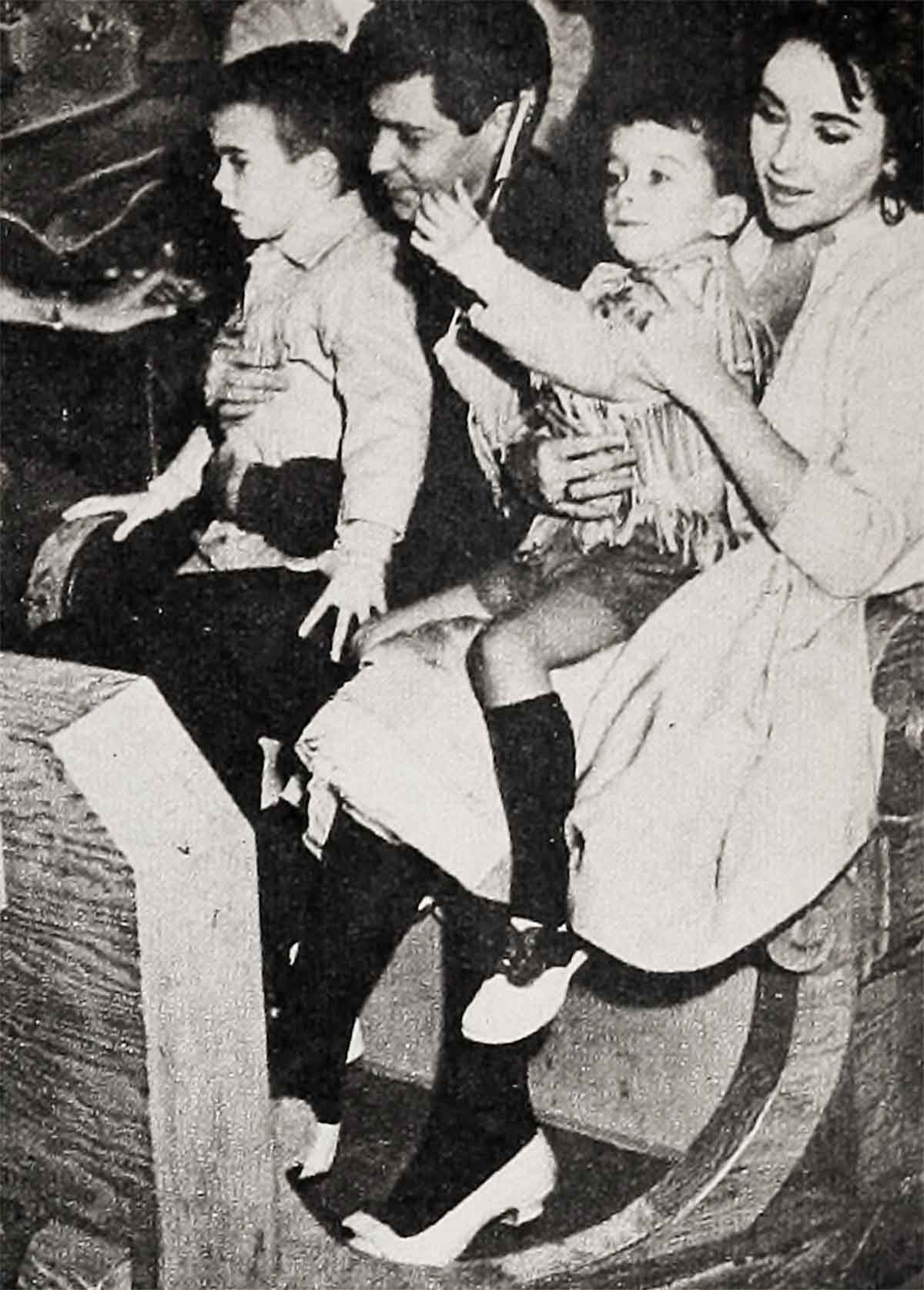
A FRIEND OF LIZ’
I hadn’t seen Liz in nearly a year. I was asked to her house in Bel-Air early the other night to discuss the possibility of writing the script for her next picture. As soon as I walked into the hallway I sensed something different about Liz. Actually, she was upstairs feeding Liza, the baby, and hadn’t come down yet. So it wasn’t Liz, the person, who gave me this feeling. Rather, strangely, it was something about the hallway. . . . The last time I’d been there was one day a few months after Mike’s death. Then, I remember, I’d walked into the hallway and noticed a big steamer trunk sitting against one of the walls. “Are you leaving town?” I’d asked Liz. “I don’t know,” she’d said, “—the trunk’s packed; if I decide to go away tomorrow it’s there, near the door, ready to be moved; I’m restless, I guess; the way I feel now I don’t know if I ever want to stay settled anywhere again. . . .” This time, however, there was no trunk near the wall. Instead, I noticed, the hall was cluttered with toys—a teddy bear, a push-pedal car, some stray blocks, a tiny catcher’s mitt. Liz, I could feel immediately, had lost her restlessness. This gorgeous collection of rooms she lived in, I felt, had become a home once again.
When Liz did come down a little while later she looked radiant—softly, beautifully, completely.
We said hello and then we went into the living room to sit and, over a cup of coffee, we began to discuss the script.
We’d been talking for about thirty minutes when a nurse walked in holding Liz’ sons—Michael and Christopher—by the hand.
The woman told Liz that the boys were—ahem—behaving just a wee bit on the naughty side that night and didn’t seem to want to go to bed.
“Liza is a good girl,” the nurse added. “She’s asleep already.”
“But she’s a baby,” said Michael, age six.
“A baby,” chimed in Christopher, all of four.
It was fun watching Liz those next few minutes, listening to her talk to the boys, trying her darndest to coax, cajole and convince them of the fact that they’d had a busy day and were indeed tired.
It worked—on Michael, at least.
He began to yawn, then he rubbed his eyes and finally he kissed his mom goodnight and walked out of the room.
But Christopher wasn’t to be fooled.
“Not me,” he said. wanna stay up with you, Mommy. Yes? Okay? Yes?—”
His plea was interrupted by a ring of the doorbell and the entrance of Eddie Fisher.
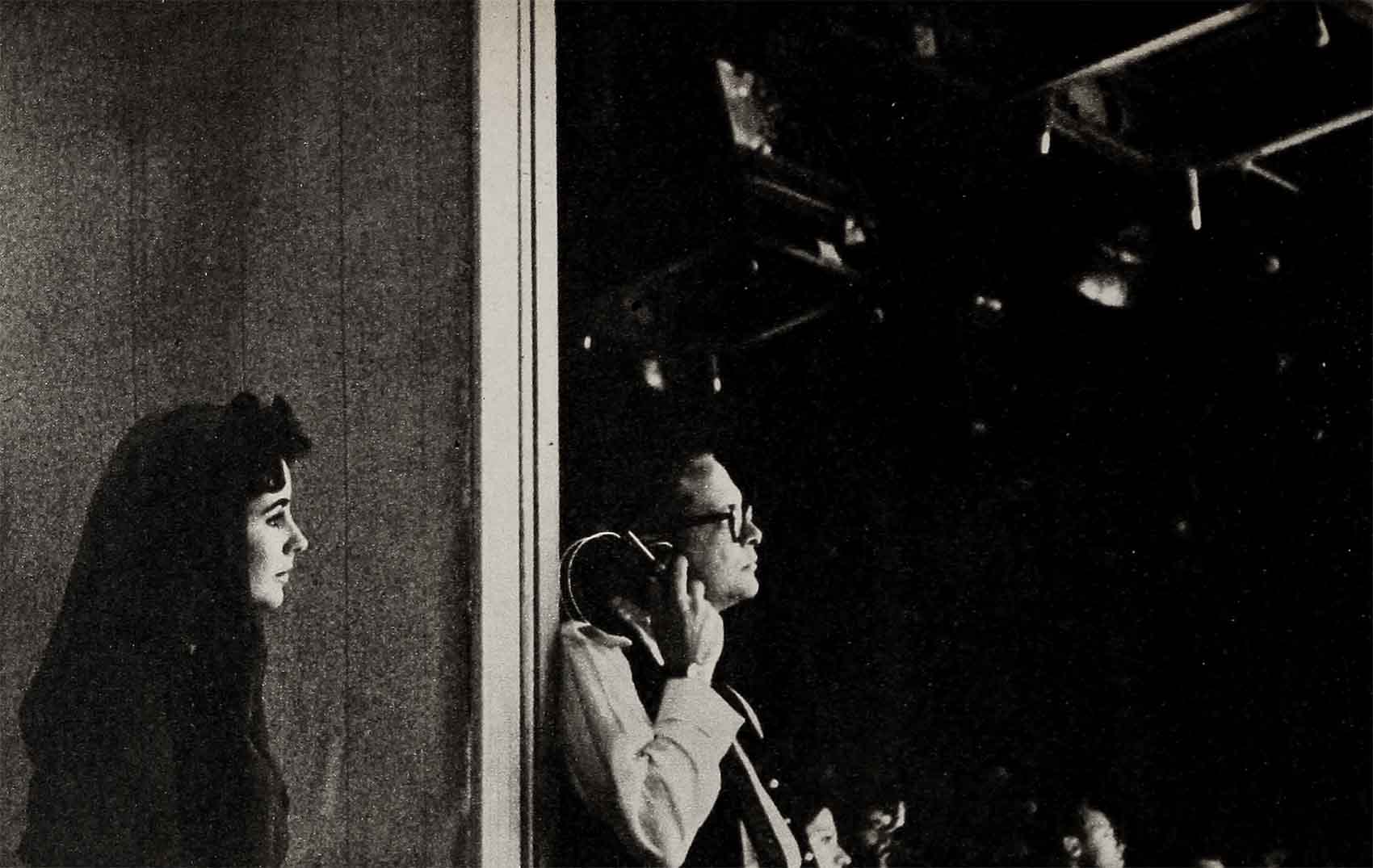
(I’d never met Eddie before, but this was obviously no time for a formal introduction. So we simply nodded at one another. Christopher to Liz and back at Christopher again—got down to the business of the moment).
“Is something wrong?” he asked.
Liz explained.
Eddie stifled a smile. “Mmmmmum, I see,” he said.
Christopher rushed up to him and threw his arms around his legs.
“I’m not sleepy,” the boy said.
“Well,” said Eddie, looking at his watch, then crouching, “it isn’t exactly early, you know . . . Maybe if I gave you an airplane ride upstairs—”
With that, he swooped the boy into his arms and up over his head.
“I’m not sleepy, though,” the boy repeated, shrieking, looking down.
But Eddie was brrrRRRrrr-ing away like a four-engine job by this time and pretending not to hear.
And within a minute Christopher had stopped his complaining and was laughing gayly, and the two of them zoomed out of the room.
“You know what’ll happen now?” Liz said to me, when they were gone. “Eddie’ll sing Christopher to sleep. He’ll be out like a light in ten minutes .. . Do you know Ruzhenkes und Mandlin?”
I told her I didn’t.
“It’s an old Jewish lullaby,” Liz explained. “Eddie’s grandmother used to sing it to him when he was a boy and wouldn’t go to sleep . . . Now Eddie’s been singing it to Christopher, on evenings when he’s here and my son decides he’d like to wait up for the dawn.”
She smiled.
Then she got up from the couch and walked across the room, to a piano.
“It’s such a beautiful song,” she said, beginning to pick out the melody with one finger.
She began to hum it as she played, and then she spoke the words:
Under the child’s crib sits a little white goat
Together in dreams they will go shopping and buy sweet raisins and almonds
Ruzhenkes und Mandlin
Ruzhenkes und mandlin. . . .
“Isn’t that nice?” she asked me when she’d finished the song.
“Very nice,” I said.
And to myself, I added, “Yes, how nice it is for you, Liz, to have found somebody to make you so happy again. . . .”
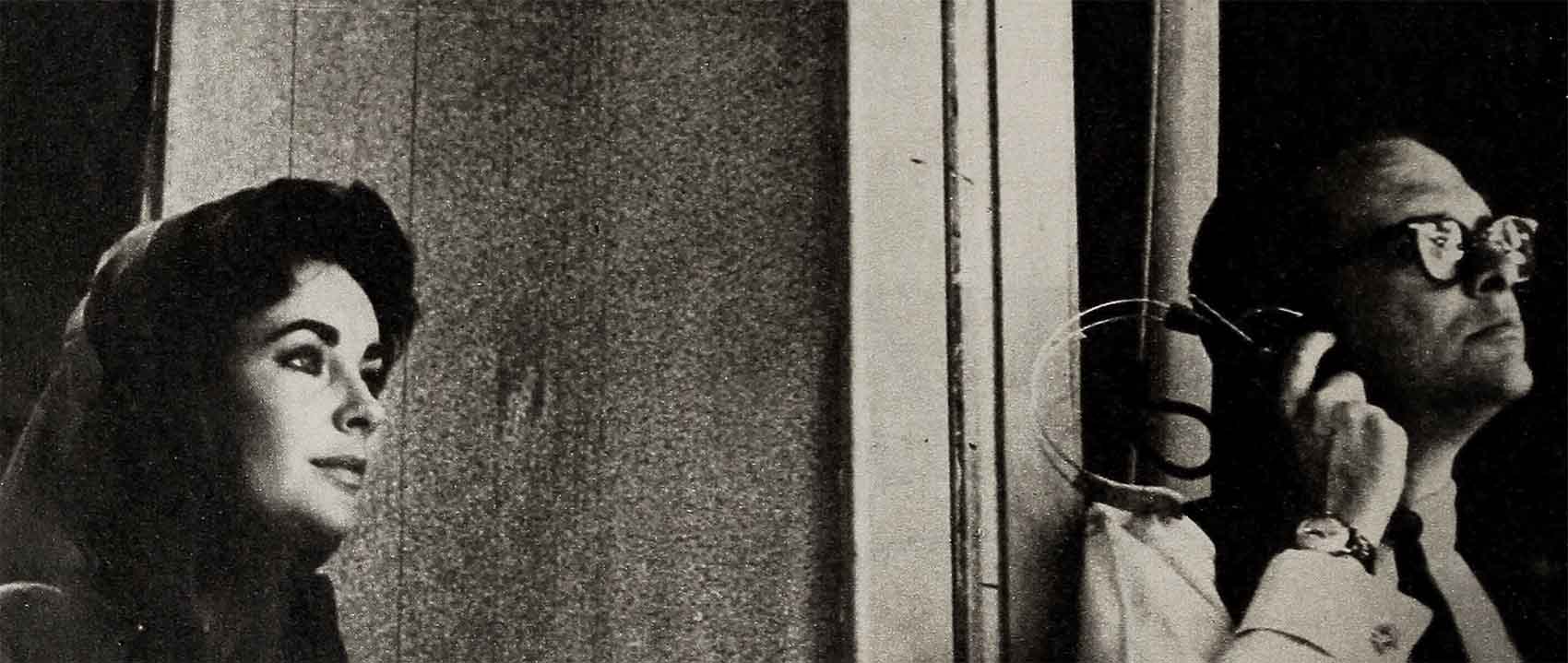
SOMEONE INSIDE EDDIE’S OFFICE
It makes me sore when I hear people say Eddie is neglecting his children ever since he’s been going with Liz. I’ve been working with him in this office for four years and, believe me, he was a wonderful father before his split-up with Debbie Reynolds and is just as wonderful a father now.
Why, at about three o’clock every afternoon he picks up Carrie Frances at the house. Then he takes her to Uncle Bernie’s Toy Store or to Wil Wright’s for an ice cream cone. And then they come here to the office and for more than an hour Carrie Frances bangs on the piano and sings with her daddy and they play peek-a-boo or hide-and-seek and then Eddie sits her down for a while so she can catch her breath and he uses that time trying to teach her how to spell. And then, just before they leave, it’s pumpernickel time. Would you believe it, but that little doll is crazy about bread—and pumpernickel’s her favorite. So every lunch time Eddie brings a slice back from wherever he’s eaten and presents it to his daughter, and the way she holds it and eats it—with her little pinky raised—you’d think it was one of the greatest delicacies that had ever been created.
Of course, Todd, Eddie’s son, is still too young to come to the office and eat pumpernickel. But he must have a pretty hefty appetite, too. Because every time Eddie sees him and has a chance to take him up to his place for a few hours, he asks me to phone Willard, the houseboy, ahead and order about twenty jars of strained foods.
And you should hear Eddie when he’s back in the office, after being with the children.
Right away, the first thing he does is pick up his phone and call Liz and start to brag.
That’s when it gets real funny.
First you hear Eddie say something like, “Do you know what my daughter did today?”
And then you can just hear Liz kid him and say something like, “Well, that may sound great to you, but let me tell you what my sons were doing at that very same age.”
Because then Eddie says, “Oh yeah?—Well, let me tell you what else she did, my good woman.”
And they laugh and laugh.
And it makes me feel good to hear Eddie laugh like that again, after such a long time.
Except that when he’s laughing, sometimes, I can’t help feel sad—thinking that even while he and Liz are having so much fun talking about Carrie Frances and Todd and Liza and Michael and Christopher, they will probably never be able to have a child of their own after they’re married.
I mean, after all, Liz has had three children by Caesarean and practically any good doctor will tell you that to have a fourth child by Caesarean section is dangerous, terribly dangerous.
And when I think that they both love children so much and that they’ll never have a tiny baby of their own they can look at and hold together, that they can never say “This is ours!”—I don’t know, but it makes me sad, like isn’t it enough that there are so many other things against them . . .?
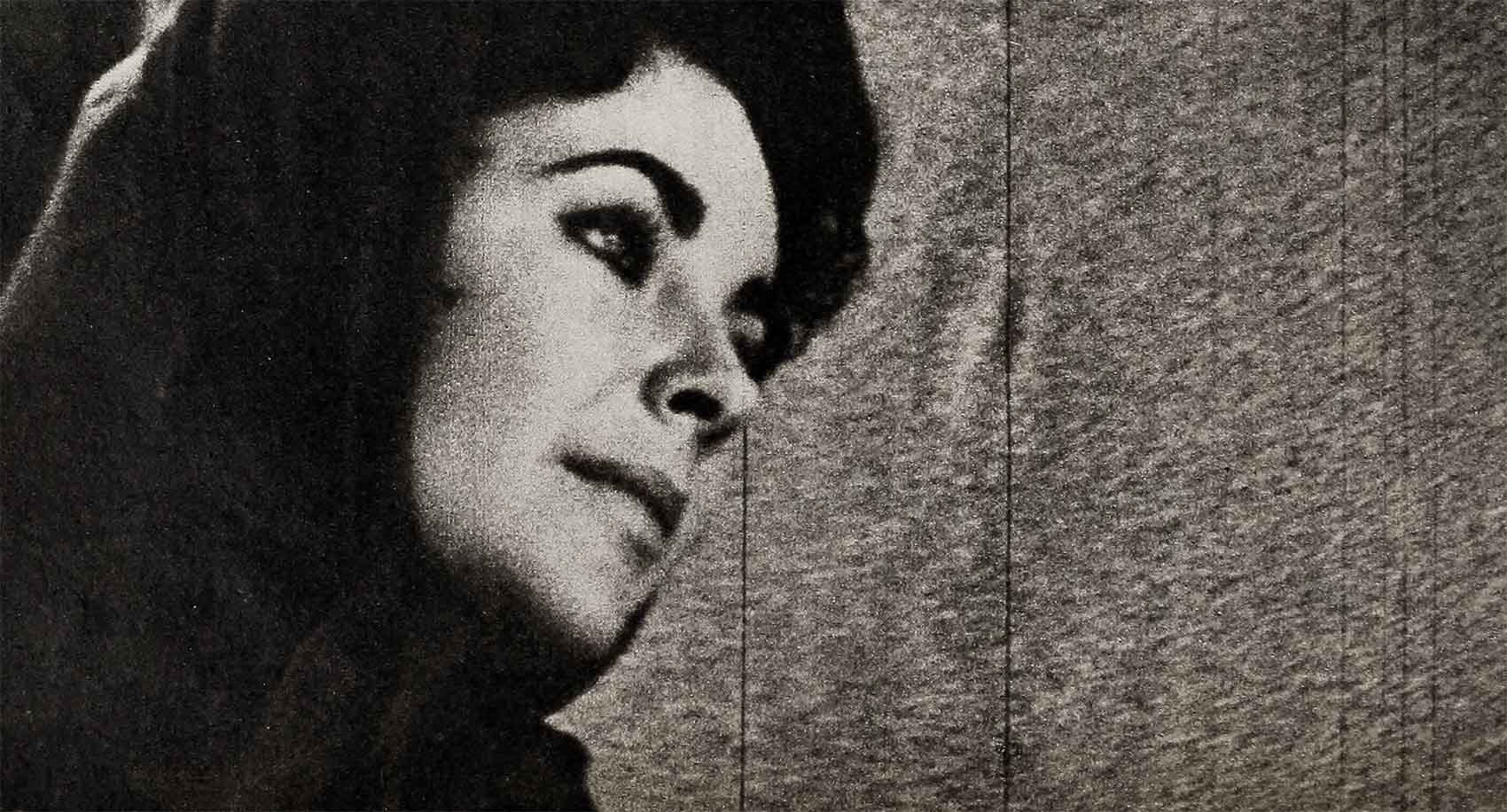
A. MUTUAL FRIEND
How would I describe their love? I’d say it’s perfect. For the simple reason that they both need one another.
Take Eddie and his needs. In the past, he’s always been a very moody fellow. Recently his career hasn’t been going too well, especially following all that unfavorable publicity. And normally this kind of turn would have put him way down in the dumps . . . But Liz has done, and iB doing, everything in her power to avoid this.
She makes Eddie feel like a man. She flatters him, she builds him up, she fusses over him, she goes out for him—all the way. And where Eddie was at one time a pretty belligerent fellow, he is now very calm. Where he was at one time tense, he is now amazingly relaxed.
It’s not always easy for Liz, either. She’s a pretty sick girl, you know. Her spine has never really healed from all those operations she’s been through and she’s in terrible pain a good deal of the time.
But knowing that Eddie is very sensitive to anyone’s being sick—the thought of anyone he loves being in pain upsets him and, oddly, makes him ill, too—and knowing that keeping him happy at this point in his life is a full-time job, Liz never lets on about how she feels.
It’s strange with Liz.
She’s really such a courageous girl in many ways. Yet recently she’d become terribly afraid of one thing, of millions of people she doesn’t even know, of the people who used to be her fans.
Oh yes. to the public she has often appeared as brazen and uncaring these past six months. Some pictures of her in newspapers and magazines have shown her beautiful face as hard, even arrogant.
But deep down, I know, she is afraid.
Eddie knows this, too.
He knew it the other night when he felt it was his turn to help her, the Sunday night he forced her to go to the movies.
He’d sat with her from time to time these past months as she read some of the unflattering mail she’s received.
He’d sat with her as she read things like:
I used to think you were great Liz Taylor. But you’re a home-wrecker and no good. Now I wonder why you don’t just get lost and leave nice families alone. Recently, a petition was passed around my high school. Exactly 128 girls—including me— signed. Our vow is never to see you in another movie again, or even mention your name.
He’d watched her read letters like this, hundreds of them, and he’d watched her after she’d read them, quiet, hurt, crying sometimes, afraid.
And the other night he decided, once and for all, to snap Liz out of her fear.
It happened as they sat looking through a newspaper together.
“This is what I’d love to see,” Liz said, pointing to an advertisement on the entertainment page. “Auntie Mame!”
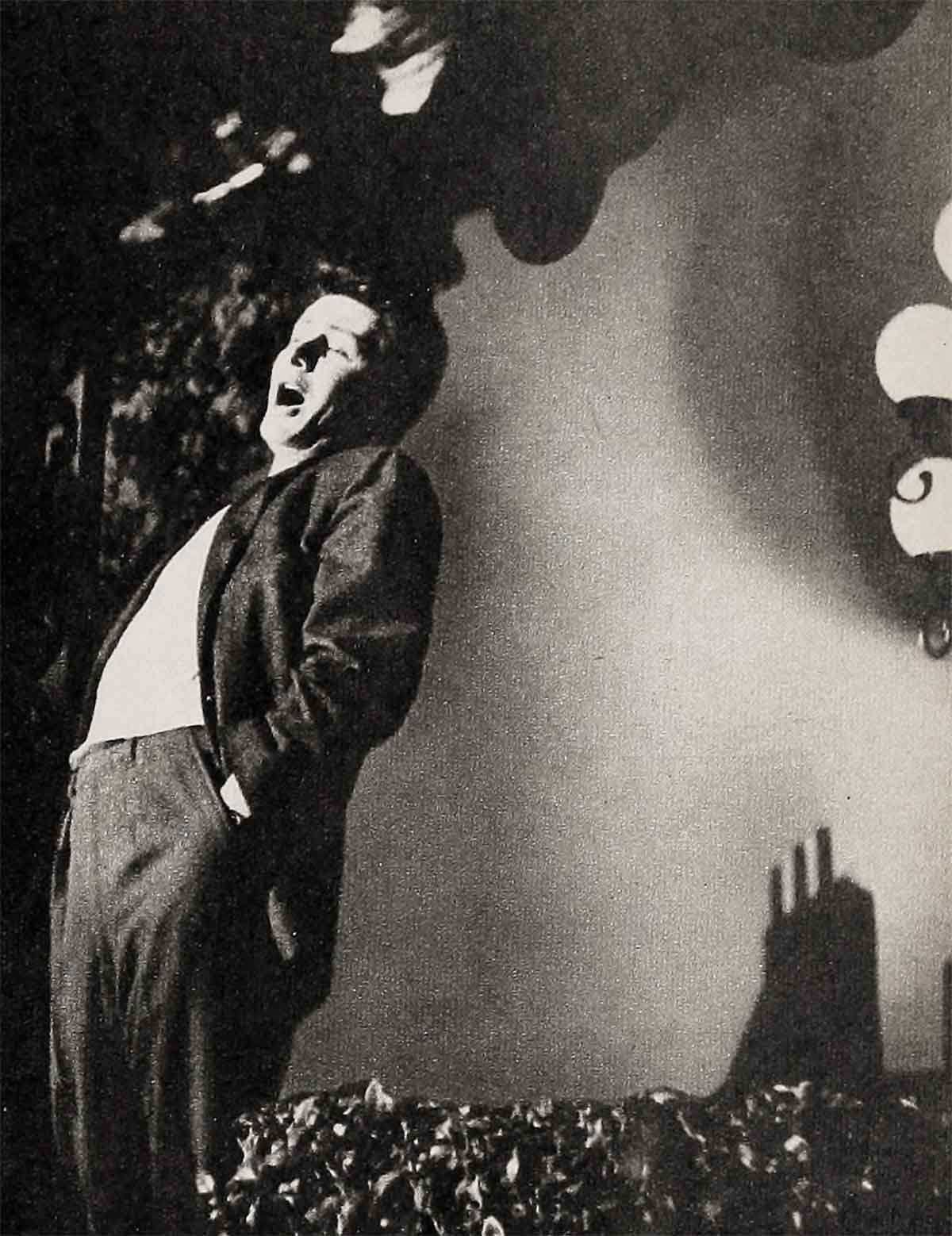
“Let’s go tonight,” Eddie said.
Liz looked at him surprised, as if to say: Me go to a public movie and take a chance on being hurt just a little more? Huh-uh. Dinner at Chasen’s or Romanoff’s once in a while is all right—places where people see you and nod at you and look away and that’s that. But a movie?
Eddie pretended not to understand.
“Why not?” he asked.
“I’d just rather not,” Liz said.
“Well, I want to go tonight,” Eddie said. His voice was firm.
Liz said nothing for a moment.
Then, uneasily, she whispered, “All right . . . if you really want to.”
When, a little while later, they neared the theater—Grauman’s Chinese on bustling Hollywood Boulevard—Eddie made a point of passing it and parking in a lot about three blocks down the street.
“Why are you doing this?” Liz asked.
“I feel like walking a little,” Eddie said.
Again his voice was firm.
Only a few people recognized them as they walked down the street, from the lot to the theater.
But those who did stared at them strangely.
“Oh, Eddie, why’d you do this, why?” Liz asked, as they continued walking.
“Everybody looking?” Eddie asked.
“Yes,” Liz said.
“Let them look,” Eddie said. “I’m a guy out walking with my girl—and if my girl’s pretty enough to stop traffic, well, let it stop!” He smiled as he said this.
But there was something in his voice now that was not quite so firm and sure as before. Secretly, he thought that maybe he had done the wrong thing, that maybe Liz wasn’t really ready for what he had planned. . . .
It was just before they got to the entrance when the woman came rushing up to them.
“Miss Taylor,” she said, putting her hand on Liz’ arm. “I was standing here looking at the old stars’ footprints and autographs in the cement, and then I saw you . . . Miss Taylor, I always thought you were so terrific. And I want you to know, between us, that I still do.”
Then the woman squinted and looked over at Eddie.
“Mr. Fisher,” she called out, “you here, too . . . Oh,” she went on, “this gives me a chance to wish you both good luck.”
She didn’t wait for an answer.
Instead, she simply wished them good luck again and rushed off.
“Funny old lady,” Eddie said to Liz inside the theater a few moments later, as he handed the usher his ticket stubs.
“A wonderful old lady,” she said.
They began to walk down the aisle.
“Eddie,” Liz went on, as they walked, “I’m glad we came tonight, real glad.”
Eddie smiled now, his first real smile of the evening. His little plan had worked.
Liz was happy. He was happy.
And that’s the way he wanted it to be for the rest of their lives, together. . . .
THE END
You can see Liz in MGM’s CAT ON A HOT TIN ROOF.
It is a quote. MODERN SCREEN MAGAZINE MAY 1959




